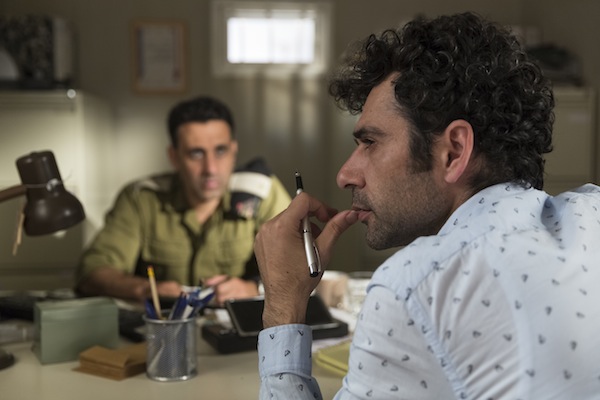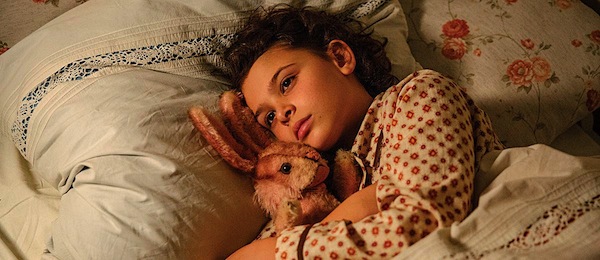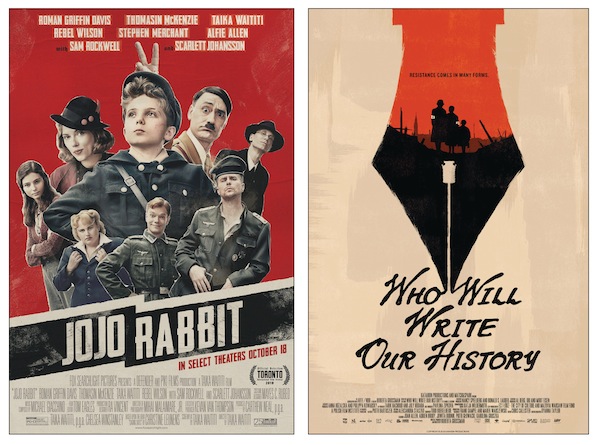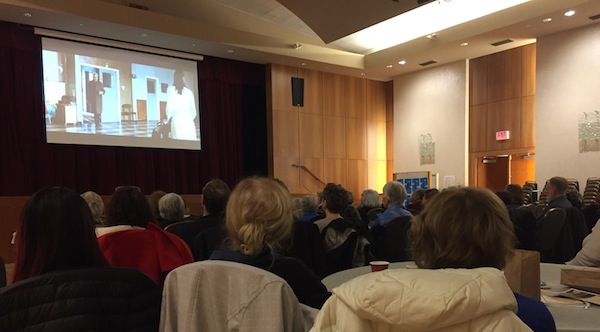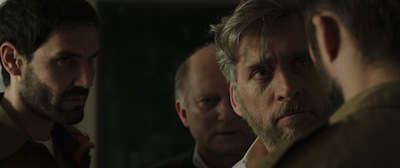Yaniv Biton as Assi, left, and Kais Nashif as Salam in Tel Aviv on Fire, which screens Feb. 28 as part of the Vancouver Jewish Film Festival. (photo from Cohen Media Group)
Palestinian writer-director Sameh Zoabi achieves something altogether remarkable with his second feature film, particularly at this moment in time: he finds humour in the tattered relationship between Israelis and Palestinians.
“The whole idea of Tel Aviv on Fire is that we have more in common than we want to admit,” Zoabi said in an interview before his movie screened in the San Francisco Jewish Film Festival last year. It screens on Feb. 28, 1 p.m., at Fifth Avenue Cinemas, as part of the Vancouver Jewish Film Festival, which runs Feb. 7-March 8.
“We have to break these stereotypes and talk about what’s in common between us and not what divides us,” he said. “Let’s remind people how humanity can prevail in times where the politics of post-Oslo is, ‘Let’s dehumanize the other to be able to survive.’ I want to do the opposite.”
A sharp, insightful and winning comedy that juxtaposes the delicious absurdity of melodrama with the real-life absurdity of the occupation, Tel Aviv on Fire centres on an underachiever, Salam, who works as a gofer on his uncle’s hit Palestinian soap opera. Through a barely plausible combination of chance, chutzpah and desperation, the shlemiel is elevated to writer. Then he runs afoul of the Israeli commander of the checkpoint he crosses every day, whose wife is a loyal fan of the show.
Salam has to use every iota of guile and cleverness to navigate the opposing agendas that he’s caught between – and to win back the heart of a woman he had dumped. (Even while he’s landing political japes, Zoabi cheerfully seizes every opportunity to lampoon the conventions of both soap operas and movies.)
One of nine children, Zoabi grew up in a village outside of Nazareth, where people went to his grandfather’s barbershop for his humorous stories as much as for a haircut.
“In general, my village is very funny,” Zoabi related. “That’s maybe why comedy has become very easy for me, because I grew up in a place where they don’t take anything seriously.”
Zoabi studied at Tel Aviv University and then at Columbia University in New York, where he discovered the need for Palestinian stories. Returning to Israel, he made a short film, Be Quiet, in 2005 and his feature debut, Man Without a Cell Phone, in 2010. Zoabi’s experience of receiving government funding was the genesis of Tel Aviv on Fire (2018).
“You take money from the Israelis, so suddenly you are watched immediately,” he explained. “Israelis are making sure you are not becoming too Palestinian for them. And the Palestinians are watching, ‘He took money, maybe he’s a sellout, he’s doing a comedy.’”
After presenting Tel Aviv on Fire at several international festivals, Zoabi debuted the film in Haifa and in Nazareth. It was equally well received by both audiences, which didn’t surprise him. But he did have an epiphany.
“All the screenings led to this moment,” Zoabi declared. “Finally I understood – people are fed up. People are fed up of the reality that exists, which is managing the occupation.
“[The film] reminds people of the possibility that used to exist, the feeling that we can be normal people and just get along. I think that’s a fantasy that existed among the Israelis, that we can eat hummus together in Damascus one day. But they aren’t able to see the occupation as a major reason for that not to happen.”
It’s a measure of Zoabi’s skill that the current-events commentary in Tel Aviv on Fire goes down easily for viewers across the political spectrum. The means to that success, in large measure, is Salam’s evolution of necessity from hapless underdog to diplomatic savant.
“I’m attracted to people who don’t wake up knowing what they really want,” Zoabi said. “I think they’re more inspirational for me than black-and-white [characters]. Actually, people who know exactly what they want terrify me. You can’t be so certain all the time.”
For his part, Zoabi grew up in a milieu of group interaction and lots of soap operas, because those were the only two channels the family had. He wasn’t exposed to art, theatre and film until his late teens.
“I always say I’m not an artist, really,” he confessed. “I’m probably a barber of a new era in my family.”
Tel Aviv on Fire is in Hebrew and Arabic with English subtitles.
For the Vancouver Jewish Film Festival schedule, visit vjff.com.
Michael Fox is a writer and film critic living in San Francisco.

